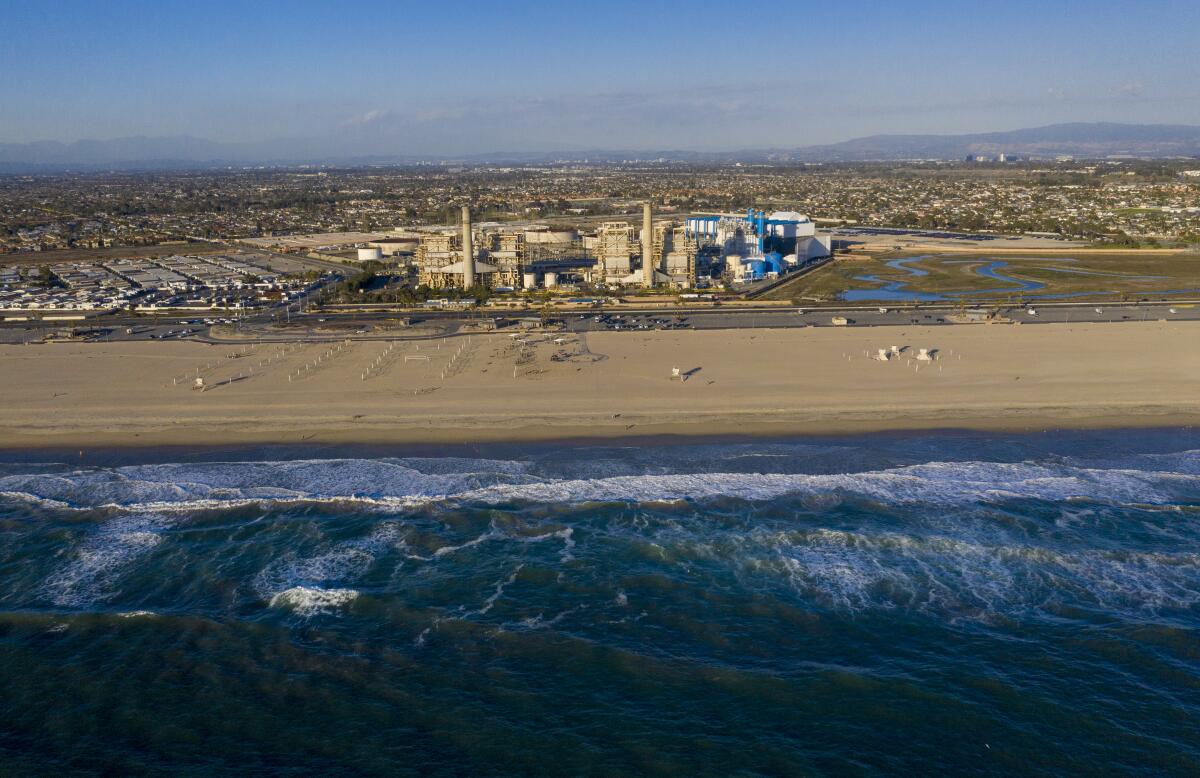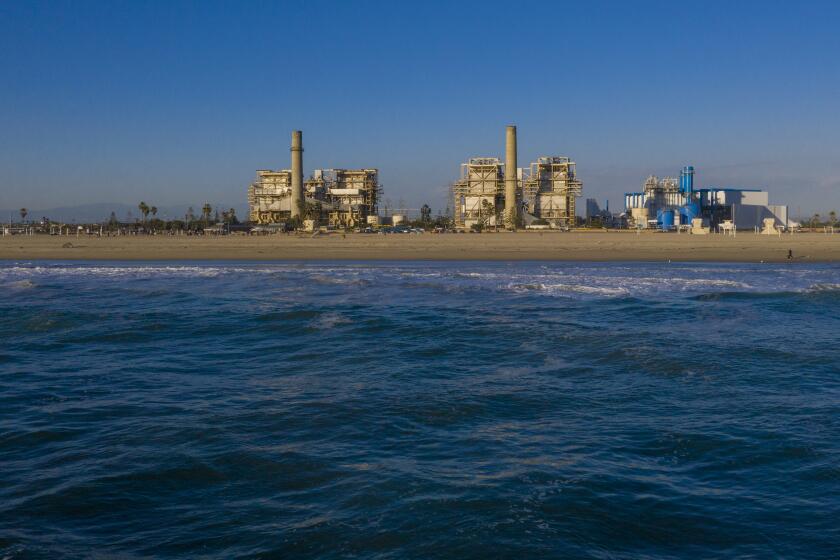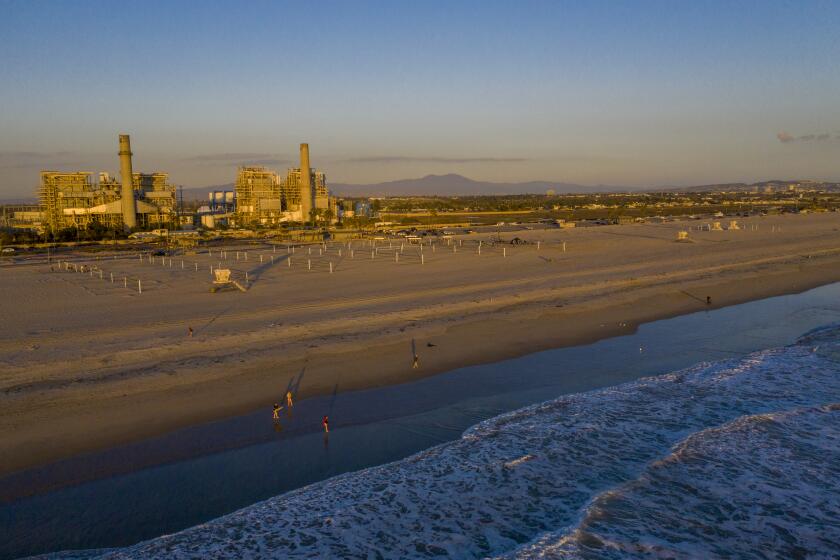Column: Desalination plant company not shy about asking for government handouts

- Share via
We all know we’re in the midst of a terrible drought in California.
And we all know we’ve got an 1,100-mile coastline.
Is desalination the answer to our problems?
No. It comes after water conservation and recycling, and is just one tool among many that might prevent the state from going dry.
But not all desalination plants are created equally, nor do all of them maximize environmental protection. And there may be no more controversial project than the one proposed for Huntington Beach.
If we know anything by now about Poseidon Water, whose parent is a Canadian company that controls $650 billion in assets globally, it’s that these people are not shy about asking for public financial incentives to build desalination plants in California.
It happened with the company’s Carlsbad plant, to the tune of several hundred million dollars, and it’s happening in Huntington Beach.
Water board debates how and when Poseidon should offset the environmental harm of its proposed Huntington Beach seawater desalination plant.
For the record:
8:33 a.m. Dec. 8, 2021An earlier version of this column said Poseidon is seeking to pump 500 million gallons of ocean water a day at its desalination plant. The company is looking to pump 100 million gallons a day.
But critics are aghast at Poseidon’s nerve in requesting $1.1 billion — from a bond fund used largely to finance affordable housing in California — to help finance the company’s controversial attempt to pump 100 million gallons a day out of the ocean.
“I’d like to highlight the level of entitlement these [company] officials seem to have,” said Marce Gutiérrez-Graudiņš, founder of Azul, a marine conservation and environmental justice nonprofit with emphasis on Latino communities.
Susan Jordan, of the California Coastal Protection Network, called the sum “outrageous,” saying it would constitute more than 25% of a pool of funds that would be better spent on the state’s catastrophic housing crisis.
The obscure California Debt Limit Allocation Committee — made up of the state treasurer, state controller and state director of finance — is scheduled to meet Wednesday in Sacramento to discuss how to allocate roughly $4 billion next year in tax-exempt private activity bonds.
The point is to jump-start “private projects that have a qualified public benefit.” The committee lists intended beneficiaries in this order: residential rental programs, first-time homebuyer programs, waste/recycling facilities and pollution control facilities.
It might be a stretch to file a desalination plant under one of those headings, but another obscure state entity — the Pollution Control Financing Authority — recommended approval of Poseidon’s $1.1-billion request in December 2019.
Meanwhile, Poseidon has asked the Metropolitan Water District for a $400-million subsidy, and it got $585 million in credit assistance through a low-interest loan from the Trump administration.
And there’s been all this panhandling despite the fact that there is no specific water shortage in northern Orange County, which has ample groundwater reserves. Which might explain why no water agency has raised a hand and said, we really can’t wait to buy your water. Poseidon, to put it another way, hasn’t lined up a customer.
I’m no financial wizard, but if the plant’s cost is estimated at $1.4 billion, why the requests for roughly $2 billion in taxpayer-funded support?
“No decision has been made on how the project will be financed,” Poseidon executive Scott Maloni told me by email. “Some (but not all) of the programs you listed that the project is eligible for might be pursued.”
Poseidon has touted the jobs the project would create, but Maloni framed the project in more existential terms.
“The realities of climate change make seawater desalination a must in California,” he said.
I will say there is undoubtedly a lot of support for this project across the political spectrum, and from labor, despite its many negatives.
Why is that?
Hard to say, but if you recall Gov. Gavin Newsom’s French Laundry gaffe — when he dined in style while telling people to stay home and take cover from COVID-19 — you may remember that the dinner was for a buddy of his who has been a Poseidon lobbyist.
And you may recall that when thoughtful questions about the need for the desalination project were raised by a member of the Santa Ana Regional Water Quality Control Board, Newsom tossed the skeptic overboard.
There are more than 16,000 desalination plants in the world, and the technology is improving all the time, helping to bring down air pollution and mitigate harmful impacts on marine habitats.
But Jordan and a slew of other environmentalists have argued that given the proposed design of the Huntington Beach plant, thousands of microscopic organisms will be killed off daily and the food chain damaged. Much of which could be avoided if the intake was beneath the ocean floor, as it is with some desalination projects.
Andrea León-Grossman of Azul said drought is caused in part by air pollution, and building huge desalination plants powered by fossil fuels doesn’t help. She also called the proposal “a $1.1-billion boondoggle that privatizes water” and would benefit a wealthy private company while the housing crisis continues to burden low-income communities of color.
And she added that San Diego, part of which drinks desalinated water from the Carlsbad plant, “has one of the most expensive water rates in the country.”
Is there any state authority that can put a stop to this, or at least show the gumption to require modifications of the design?
Yes. The California Coastal Commission.
Building a plant to remove the salt from seawater in Huntington Beach is not just bad for the environment; it’s bad for California ratepayers.
But on Oct. 16, Poseidon’s Maloni posted a link on his Facebook page to an effort to gather 1 million signatures for a snake oil ballot measure called the Water Infrastructure Funding Act of 2022, whose backers include Poseidon desalination proponents.
My colleague Michael Hiltzik described the measure as a water and money grab primarily by Big Ag. He argued that it would shred regulatory authority and environmental protections and stick taxpayers with the bills for water projects that benefit agribusiness, among other interests.
It would also neuter the Coastal Commission.
Developers of, let’s say, a desalination plant could ignore a permit denial and go straight to the governor’s secretary of natural resources to request an overrule.
Did I mention that Poseidon has applied for a permit from the Coastal Commission to build its desalination plant but has refused to pay the $326,000 permit fee, even as it grabs whatever public funds it can get its hands on?
The word is chutzpah.
The governor and his minions can roll over, but the rest of us don’t have to.
More to Read
Sign up for Essential California
The most important California stories and recommendations in your inbox every morning.
You may occasionally receive promotional content from the Los Angeles Times.













